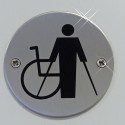Jobs for people with disabilities are hard to get even during good economic times.
When the American economy was rapidly growing, practically everyone who wanted a job could get one. Microsoft and other companies were desperate to hire computer, information technology and other workers. It is shocking to know that Americans with disabilities still had such a high level of unemployment in the middle of one of the largest peacetime economic expansion in US history.
During tough economic times, employment for people with disabilities are even tougher to get. Millions of job seekers are waiting many months or even years to get a job.
What makes matters worse is that non-disabled job seekers are competing for previously-allocated jobs for people with disabilities. A report released by the Department of Labor (February 2009) showed an unemployment rate among disabled workers of 14%. This is almost double the unemployment rate for non-disabled workers.
Despite the fact that many people with disabilities are highly skilled professionals, they have so much trouble finding a job.
Why is the unemployment rate for disabled people high during good times and tough economic times?
Part of the problem is misperception as well as discrimination based on this faulty perception. Although it’s illegal, discrimination can still play a factor in disabled job seekers not getting hired. Many prospective employers have the belief that they would be taking on a higher risk by hiring someone who is disabled. They have the mistaken view that disabled workers are more likely to take time off due to illness and are less likely to hold down the job.
The Bobby Dodd Institute (BDI) in Atlanta provides job training and rehabilitation for people with disabilities. According to BDI studies, disabled workers have one of the highest job retention rates in the industry — up to 87%. It’s hardly surprising that disabled workers are more likely to keep their jobs since they often have to overcome many roadblocks to get a job.
Despite the fact that many disabled people are highly skilled, dependable and good workers who are more likely to stay in their jobs, misperception about people with disabilities can keep them from getting a job. Moreover, studies have shown that disabled workers are more likely to earn less than non-disabled co-workers and are less likely to be promoted.
Without changes in perception of employment of people with disabilities as well as behavior and hiring practices of employers, the economic outlook for many disabled people are not likely to change.
People with disabilities often have huge roadblocks keeping them from getting a job — during good times and tough economic times. Due to extra-ordinary difficulties associated with job search, many disabled people “create their own jobs” and start their own businesses.
Most disabled entrepreneurs use their personal savings to start their small business, but you don’t have to do that. Like many Internet entrepreneurs, you can start a micro-business on a shoestring. You can avoid spending a lot of money by learning how to work at home for free. You can use free online tools to generate income from the Internet.


